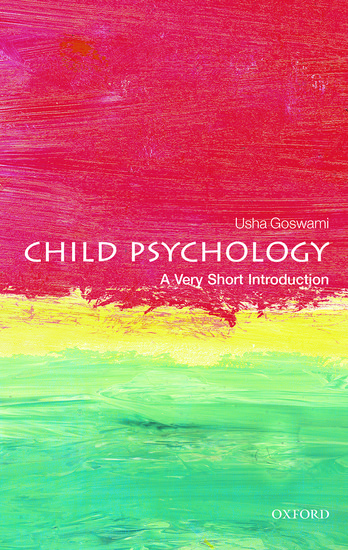Home >
A Very Short Introduction >
Child Psychology (Psychology)
A Very Short Introduction | Psychology
Child Psychology
ISBN: 9780199646593
Series: A Very Short Introduction
Child Psychology (Psychology)
A Very Short Introduction Child Psychology (Psychology) Media > Books > Non-Fiction > Education Books Expect Delays of Up to 4 Weeks| Order Below |
ISBN
9780199646593 (10-digit ISBN: 0199646597)
- Description
- Key Features
- Series Description
- Table of Contents
- Looks at cutting-edge research about child psychology and development
- Incorporates information from various areas of psychology to demonstrate how children develop
- Considers the influence of friendships, families, and the imagination
- Explores how children learn in different ways, in relation to genetics and the workings of the brain
- Explains how children develop self-awareness and an understanding of the physical, biological, and social worlds
This Very Short Introduction provides an up-to-date, authoritative, and accessible guide to modern child psychology, from birth to early adolescence. Beginning with infancy, Usha Goswami considers the process of attachment and 'bonding', showing how secure attachments enable the development of self-understanding. Exploring childhood learning, ranging from aspects of language and thinking to cognitive reasoning, Goswami looks at how babies and toddlers develop an understanding of the physical, biological, and social worlds, and develop complex abilities like language and morality.
Demonstrating how learning is shaped by the environments surrounding the child; at home, school, with peers, and in wider society, Goswami emphasizes the importance of childhood friendships and siblings for psychological development. Introducing the key theories in child psychology, Goswami explains why children develop as they do and how society can further optimize their development through the adolescent years.
Oxford's Very Short Introductions series offers concise and original introductions to a wide range of subjects--from Islam to Sociology, Politics to Classics, Literary Theory to History, and Archaeology to the Bible.
Not simply a textbook of definitions, each volume in this series provides trenchant and provocative--yet always balanced and complete--discussions of the central issues in a given discipline or field. Every Very Short Introduction gives a readable evolution of the subject in question, demonstrating how the subject has developed and how it has influenced society. Eventually, the series will encompass every major academic discipline, offering all students an accessible and abundant reference library.
Whatever the area of study that one deems important or appealing, whatever the topic that fascinates the general reader, the Very Short Introductions series has a handy and affordable guide that will likely prove indispensable.
Please note: As this series is not ELT material, these titles are not subject to discount.
1: Babies and what they know
2: Learning about the outside world
3: Learning language
4: Friendships, famillies, pretend play and the imagination
5: Going to school
6: The learning brain
7: Theories and neurobiology of development
Further reading
Index
This Very Short Introduction provides an up-to-date, authoritative, and accessible guide to modern child psychology, from birth to early adolescence. Beginning with infancy, Usha Goswami considers the process of attachment and 'bonding', showing how secure attachments enable the development of self-understanding. Exploring childhood learning, ranging from aspects of language and thinking to cognitive reasoning, Goswami looks at how babies and toddlers develop an understanding of the physical, biological, and social worlds, and develop complex abilities like language and morality.
Demonstrating how learning is shaped by the environments surrounding the child; at home, school, with peers, and in wider society, Goswami emphasizes the importance of childhood friendships and siblings for psychological development. Introducing the key theories in child psychology, Goswami explains why children develop as they do and how society can further optimize their development through the adolescent years.
Key Features
- Looks at cutting-edge research about child psychology and development
- Incorporates information from various areas of psychology to demonstrate how children develop
- Considers the influence of friendships, families, and the imagination
- Explores how children learn in different ways, in relation to genetics and the workings of the brain
- Explains how children develop self-awareness and an understanding of the physical, biological, and social worlds
Series Description
Oxford's Very Short Introductions series offers concise and original introductions to a wide range of subjects--from Islam to Sociology, Politics to Classics, Literary Theory to History, and Archaeology to the Bible.
Not simply a textbook of definitions, each volume in this series provides trenchant and provocative--yet always balanced and complete--discussions of the central issues in a given discipline or field. Every Very Short Introduction gives a readable evolution of the subject in question, demonstrating how the subject has developed and how it has influenced society. Eventually, the series will encompass every major academic discipline, offering all students an accessible and abundant reference library.
Whatever the area of study that one deems important or appealing, whatever the topic that fascinates the general reader, the Very Short Introductions series has a handy and affordable guide that will likely prove indispensable.
Please note: As this series is not ELT material, these titles are not subject to discount.
EASY ORDER FORM
PRICES LISTED INCLUDE CONSUMPTION TAX
Price Before Tax:
¥1,790


